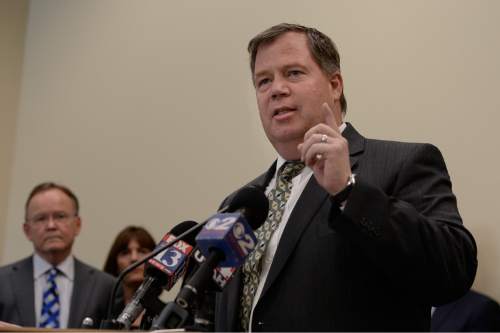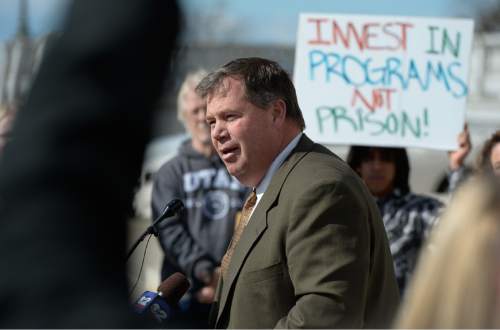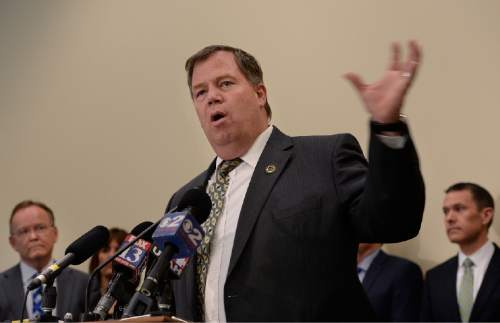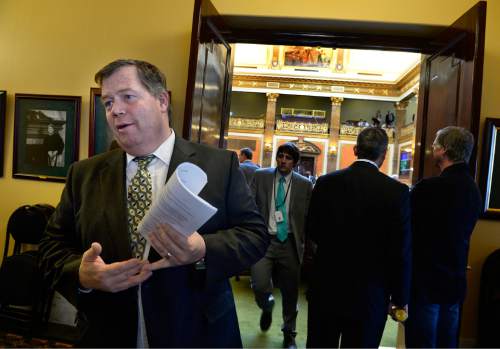This is an archived article that was published on sltrib.com in 2015, and information in the article may be outdated. It is provided only for personal research purposes and may not be reprinted.
In Utah's Capitol, liberal ACLU leaders stood next to conservative state lawmakers cheering on a bill that would detour drug addicts from prison cells to treatment programs. It also would reduce criminal penalties for getting caught with an illicit substance.
Just days later, President Barack Obama held a bipartisan meeting on criminal-justice reform in the White House and among those in attendance were Sen. Mike Lee and Rep. Jason Chaffetz, Utah's most conservative members of Congress.
In this fractious political world, it seems both parties are reaching the same conclusion: It's time to roll back some of the "tough-on-crime" laws that have ballooned the nation's prison population.
A change in Republican philosophy appears to be morphing the reforms from mere theories into new laws, both in Utah and throughout the nation.
"I don't think there is any question about it that conservatives have held the cards on this issue for a long time," said Adam Gelb, director of the Pew Charitable Trusts' Public Safety Performance Project. "The fact that so many conservatives who used to support prison expansion have gotten behind reform has probably been the single most important driver of this wave of change."
—
Late to the party • State Rep. Eric Hutchings, R-Kearns, thought he was on to something novel. He wanted to reduce the number of drug addicts and mentally ill people in prison. To do this, he envisioned a more thorough screening process that would send nonviolent offenders to treatment, both in and out of prison, then give parole officers more resources to ensure these people don't reoffend.
He attended a conference in San Diego and learned that Utah would be far from the first state to try such at thing. In fact, it would be the 30th.
"We're Johnny-come-lately to this whole game," Hutchings said.
Texas is the state that tipped the criminal-justice domino, and it did so for the same reason many states followed suit — it didn't want to spend any more cash on prisons. Texas projected that it would need another penitentiary to house an estimated 17,000 new inmates. State lawmaker Jerry Madden, a Republican, dug into the numbers and saw that many nonviolent offenders, most of whom were locked up on drug charges, were serving longer and longer sentences.
So instead of building another prison, the state shifted millions of dollars into drug courts, job programs and treatment. Since then, Texas has closed three prisons and, over a five-year period, saw its prison population drop 9 percent.
Madden, along with the U.S. Department of Justice and nonprofit groups, including Pew and the Council of State Governments, have since proselytized about the power of "justice reinvestment." They have formalized a series of recommendations and created a blueprint that each state can tailor to its own circumstances.
Utah teamed with Pew to study its system. Hutchings has heard the Texas story many times, and while he supports the Lone Star State reforms, he dislikes comparing what happened there to what he's trying to do here.
"They are getting attention because they are the most improved," he said. "They are getting attention because their systems were failing."
—
Law and order • The United States has the world's highest incarceration rate. According to 2013 numbers, the most recent available, 478 out of every 100,000 people were behind bars. That equates to 1.5 million people.
Utah's incarceration rate is 242 for every 100,000 residents and its total prison population is a little more than 7,000 people. Only six states have a lower incarceration rate than Utah. They are New Hampshire, North Dakota, Rhode Island, Massachusetts, Minnesota and Maine.
On the flip side is Texas, which has the nation's largest prison population (more than 160,000) and its fourth highest incarceration rate (602). That's six years after the state decided to buck its "law-and-order" reputation by adopting criminal-justice reforms, and the prison population dropped 9 percent from 2007 to 2012. Since then, the inmate count has rebounded slightly and the state still has 59 prisons, not including jails that take state inmates, geriatric units and transfer facilities. Utah has two prisons, though it also contracts with 22 jails to house inmates.
Hutchings said Utah's system doesn't have Texas-size problems, but it isn't functioning the way it should. Pew and the Utah Commission on Criminal and Juvenile Justice (CCJJ) studied the state's stats.
Utah's incarceration rate is small, but has grown in recent years, while most states have seen their rates fall, according to Ron Gordon, director of CCJJ.
Two-thirds of the people entering the prison system each year are there because they violated probation or parole. A little more than 40 percent of that group violated for a technical reason; they didn't commit a new crime.
The review also found that people are serving at least two months more for the same crime than they did a year ago.
"Some of our so-called 'get-tough policies' have not had the desired effect," Gordon said. "Now we are in a position to look back at the past few decades and see the results of a variety of criminal-justice policies. With that hindsight, simply increasing penalties doesn't reduce recidivism. It sometimes increases recidivism."
Hutchings' bill would reduce penalties for drug crimes possession from a third-degree felony to a class A misdemeanor.
County prosecutors worry that change would send a message that drug crimes are not serious and make it harder for them to strike plea bargains. Sheriffs fear it could shift inmates, and the costs of housing them, from the state prison to county jails. A House committee unanimously approved Hutchings' bill on Friday.
Hutchings' hope is that an expected reduction in probation and parole violators would ease any financial burden and he believes shorter sentences for drug crimes would move people out of jails faster. More than anything, he argues it's time to try to stem the growth in crimes tied to addiction.
"Eight out of 10 people in prison have a drug issue," he said. "That's huge. That's the biggest it's ever been in the state."
—
National momentum • The 29 states that already have adopted some reforms — a group that includes Idaho, Arizona and Nevada — have focused extensively on drug crimes, largely because the public has become moresympathetic to a treatment-first model.
"This is an area where the research and public opinion have come into alignment," said Pew's Gelb. "People are sick and tired of seeing drug-addicted offenders cycle in and out of prison over and over and over again at tremendous costs to the taxpayers, with little apparent benefit for public safety."
National politicians have seen what's happened in the states and have created bipartisan teams to support federal reforms.
Sens. Mike Lee, R-Utah, and Dick Durbin, D-Ill., have a bill to let nonviolent offenders avoid harsh minimum-mandatory sentencing. Rep. Jason Chaffetz, R-Utah, is part of a team pushing legislation that would let drug offenders earn an early release from a federal sentence. Another measure, backed by Sens. John Cornyn, R-Texas, and Sheldon Whitehouse, D-R.I., would adopt a questionnaire that states use to determine if an offender is a low, medium or high risk to commit another crime. Hutchings' bill also would adopt such a questionnaire.
"It's no longer enough to be tough on crime. We have to be smart on crime as well," Chaffetz said. "States have successfully implemented these strategies. As a result, they've seen recidivism drop as well as cost."
That's a big shift from the War on Drugs launched by President Richard Nixon in the '70s or the tough-on-crime legislation of the 1990s.
At a time when Congress often uses stopgap bills just to keep the government running, Republicans have found an issue they appear willing to work on with Obama and the Democrats — and that's a rare sight.
mcanham@sltrib.com Twitter: @mattcanham











